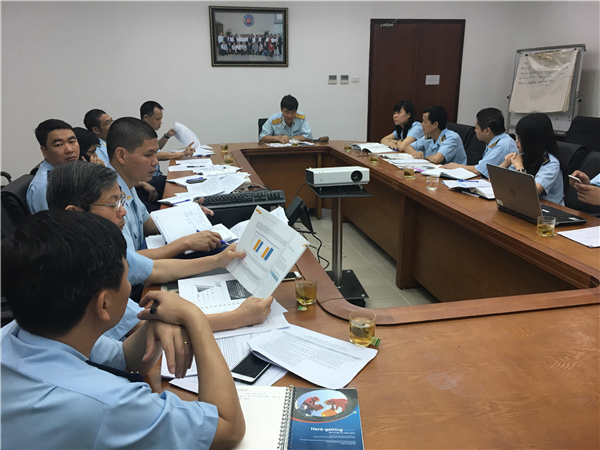Procedure for Disciplinary Action against Violating Customs Officials
Decision No.2627/QD-TCHQ by the General Department of Customs stipulates the disciplinary procedure for officials in the Customs sector who violate the regulations of the law, the Ministry of Finance, and the Customs sector as follows:
Step 1: Violating customs officer writes a personal self-criticism report
- When an official commits a violation, the unit head directs the collection of documents, evidence, inspection, and verification to conclude the official's violation. The official is required to write a personal self-criticism report and participate in a review and disciplinary process according to regulations.- The self-criticism report must be comprehensive, clear, and honest, identifying the violation and suggesting a corresponding disciplinary action from one of six forms: reprimand, warning, salary downgrade, demotion, dismissal, or termination (if the official holds a leadership position) or one of four forms: reprimand, warning, salary downgrade, termination (if the official does not hold a leadership position).
If the violating official's first self-criticism report does not meet the requirements, the unit head will request a second or third report until satisfactory.

Step 2: Organize a review meeting for the violating customs officer
- The head or deputy head of the unit with the violating official presides over the review meeting. The violating customs officer's review is held at their unit.- The meeting must be recorded, detailing all comments, with a specific conclusion about the responsibility, the nature, and the degree of the official's violation and propose a collective disciplinary action towards the violating official.
Step 3: Establish a Disciplinary Council and hold a Disciplinary Council meeting
Authority to establish the Disciplinary Council:
- For Provincial Customs Departments: If the violating official falls under the authority of the Provincial Customs Department as per staff management allocation, the head of the department issues a decision to establish the Disciplinary Council;- For the General Customs Department: If the violating official falls under the authority of the General Customs Department as per staff management allocation, the head of the department issues a decision to establish the Disciplinary Council.
Organize the Disciplinary Council meeting:
- Before organizing the Disciplinary Council meeting, a summons must be sent to the violating official. If the official is absent, a valid reason must be provided. If, after three summons, the official still does not appear, the Disciplinary Council will still meet to review and propose disciplinary actions.- The Disciplinary Council may invite representatives from political organizations and socio-political organizations where the violating official works to attend the meeting. Invitees can offer opinions and suggest disciplinary actions but cannot vote on the disciplinary actions.- The meeting procedures are carried out according to the provisions in Clause 2, Article 19 of Decree 34/2011/ND-CP. After the meeting, the Disciplinary Council must provide written recommendations on the disciplinary action to the competent authority for handling the official's discipline.
Step 4: Issue and circulate the disciplinary decision for the official
- Before issuing the disciplinary decision, the relevant party’s opinion must be sought:- If the official is a head of Division and equivalent levels under the Provincial Customs Department, the head of the department must ask the Communist Party Committee for their opinion.- If the official holds a position equivalent to Deputy Director under the General Department, the head of the General Department must ask the General Department Communist Party Committee for their opinion;- If the official is a Deputy Head of the Provincial Customs Department (excluding Deputy Heads of Hanoi and Ho Chi Minh City Customs Departments), the head of the General Department must seek the Central Standing Committee's opinion.- The procedure for issuing the disciplinary decision: Conduct according to Clause 1, Article 20, Decree 34. Note: The disciplinary decision must include the provision: “This decision takes effect for 12 months from the date of signing.”- The disciplinary decision must be sent to the violating official, relevant units for enforcement, and publicly announced for general education within the agency or unit.
After 12 months from the effective date of the disciplinary decision, if the customs official does not re-offend or does not violate to the extent of requiring another disciplinary action, the disciplinary decision will automatically cease to be effective.
Step 5: Implement reporting and managing discipline records policies
Reporting regime:
- Annual periodic reports: Period I from December 16 of the immediately preceding year to June 15 of the reporting year; Period II from June 16 to December 15 of the reporting year.- Ad-hoc reports as required by the competent authority.
Managing discipline records:
- The records and documents related to handling discipline and the disciplinary decisions of any official must be kept in the personal records of that official.- The form of discipline must be added to the official’s profile. The disciplinary decision for officials under the authority of the Provincial Customs Department must be sent to the General Department (Personnel Organization Department) for monitoring.
See more Decision 2627/QD-TCHQ.
- Financial support levels for purchasing and repairing of medical equipment for the Economic - National Defense Corps in Vietnam from December 30, 2024
- Latest regulations on management and use of passports for officials and public employees of the Ministry of Finance of Vietnam
- New regulations on the procedures for veterinary sanitation inspection in Vietnam from January 6, 2025
- Procedures for issuing a License for eligibility to operate a nightclub service in Vietnam
- Regulations on conditions for organizing legal knowledge examinations on road traffic order and safety in Vietnam from January 1, 2025
- Responsibilities of competent authorities in testing legal knowledge on road traffic order and safety in Vietnam from January 1, 2025
-

- Financial support levels for purchasing and repairing ...
- 09:00, 23/11/2024
-

- Latest regulations on management and use of passports ...
- 08:30, 23/11/2024
-

- New regulations on the procedures for veterinary ...
- 08:00, 23/11/2024
-

- Procedures for issuing a License for eligibility ...
- 19:00, 22/11/2024
-

- Regulations on conditions for organizing legal ...
- 18:30, 22/11/2024
 Article table of contents
Article table of contents
